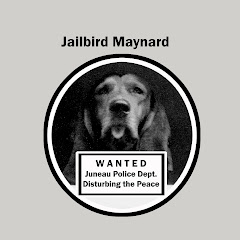Part of my problem is the scanty photographic record. I got some nice pics from Alison Browne and Pat Williams from my old Legislative Finance days; but they are mostly snapshots of just us staff folks. And to do justice to any of the REALLY good stories, it would be nice to have action photos of some of the solons themselves. You would think that Google would have a variety of pics of state legislators from the 1980's - lord knows they have images of lots of pretty obscure stuff - but unfortunately they do not. And I do not have the time or the inclination at the moment to spend time in newspaper archives which is probably the best source.
Which is a long-winded way of saying I'm sorry I don't have more pictures to accompany these entries.
So here we go. In June 1979 I arrived back in Juneau with a freshly-minted baccalaureate degree in Public Administration eager to embark on a career as a bureaucrat with the State of Alaska. As I recall, Doug had immediately gone back to work for the Division of Legislative Finance as a Page upon our return from Bellingham; but subsequently got a more lucrative offer from his brother-in-law to go seining. And since there was an upcoming special legislative session and I was available - I was hired to replace Dougie.
The hiring process was noteworthy insofar as it pretty much set the tone for my next 28 years of public service - the go with the flow approach to career development. The "interview" took place after hours at Louie's Douglas Inn and was conducted by the division's Administrative Assistant, Pat Williams. Dougie attended to offer moral support. The details of this meeting are a tad murky in my mind; but by the end of the evening P.W. concluded that I had exactly the Right Stuff to be the division Page - the duties for said position consisting mostly of making copies, delivering stuff to offices, and NOT antagonizing any of the esteemed Members.
Apparently I performed my duties satisfactorily. Later that summer, after the special session had ended, (they kept me around afterward to make sure there was a warm body in the reception area since P.W. and others had previously scheduled vacations) I finally managed to secure a job interview at the Department of Labor for an Accounting Technician position. But fate intervened when Jay Hogan, the Director of the Division of Legislative Finance, intercepted me on the way out the door to the interview.
Jay: "Where are you going?"
Elmer: "To a job interview at the Department of Labor."
Jay: "For what job?"
Elmer: "Accounting Technician."
Jay: "Do you want to be an Accounting Technician for us?"
Elmer: "Sure."
Jay: "OK. Guess you don't need to go to the interview."
Elmer: "Guess not."
I've always liked the legislature's personnel system...
 Elmer Lindstrom, Page, Division of Legislative Finance
Elmer Lindstrom, Page, Division of Legislative Finance
Jay Hogan, Director of the Division of Legislative Finance
I beavered-away in the administrative office for the next few months - with the understanding that if I didn't piss-off anyone important - I would be moved into a fiscal analyst trainee position the following year.
But before proceeding further, a quick explanation of what the Division of Legislative Finance was all about is in order. Back in these antediluvian times, legislators had little or no personal staff. In fact until right about this time many of them hadn't even had offices. "Professional" staff were limited to the Division of Legislative Audit, Legislative Legal Services (primarily bill drafting) and Legislative Finance. The finance folks supported both the House and Senate Finance Committees in analyzing and drafting the annual budget and other revenue and appropriation matters. All these staff were non-partisan.
In real life terms what fiscal analysts did - in those days, at least - was hold the hands of members of the finance committees. The duties involved at least as much social work and counseling as they did actual budget analysis. Each analyst had a particular area of the budget that was his or her responsibility and he or she would work with subcommittees in both the House and Senate to develop initial budget recommendations for each full Finance Committee. Then each Finance Committee would pass it's own version of the budget to the floor of their respective body for adoption by the full House or Senate. Ultimately, a conference committee, in those days a FREE conference committee, would iron out the differences between the House and Senate versions of the budget and then the final conference committee bill would be adopted by both bodies and sent to the Governor.
Thus, each analyst had to be adept at discerning, at each step of the process, just what it was that each subcommittee (particularly the Chair), each full committee, and ultimately, what each body (the House and Senate) were trying to accomplish. And you had to try to provide them all with suggestions on how to meet their respective goals.
Needless to say the goals of the various members, subcommittees, and committees were often in conflict. Therefore, to be truly effective a fiscal analyst first and foremost had to have - how shall I say this - a high tolerance for ambiguity - an ability and willingness to work both sides of an issue at the same time. I am proud to say I excelled at this line of work.
Coming soon: "Senator, my name is not Peter."


































No comments:
Post a Comment